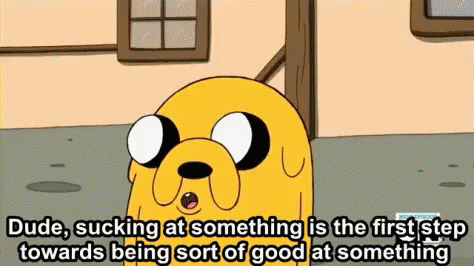
This is a popular topic, so I’m not going to add yet another blog post on what this means. Instead, I’m going to share some stories and link some articles I liked on this topic.
Articles
- Why Should You Adopt a Growth Mindset? (short, has a nice diagram!)
- What is a Growth Mindset? (medium)
- Covers popular myths too, like “you either have it or you don’t” AKA the myth of natural talent
- My thoughts on talent: yes, some people may naturally get things more easily, but effort and training goes farther in the long term than talent any day. There are people who are both talented and hard working, but they’re truly, truly rare.
- Misconceptions around Growth Mindsets (short)
- I really like this article – to summarize, there are three big misconceptions:
- a growth mindset is the same as being and open minded
- a growth mindset is the same as positive reinforcement around effort (i.e. just praising and rewarding effort)
- just adopt a growth mindset and life will be good all the time
- I really like this article – to summarize, there are three big misconceptions:
- 15 Actionable Steps to Adopting a Growth Mindset (long)
Singing, Growth Mindsets, and You
I’d like to note that those articles above explain the difference between growth and fixed mindsets, but I think they need a little more detail on why you should adopt a growth mindset. I’ll do so by telling a story from my own life!
My History with Singing
I’ve been taking singing lessons for a few years now, and when I was younger, I assumed that people were just good at singing, while I was doomed to be tone deaf and not good at singing. I really wanted to learn to sing though! Music has impacted my life in meaningful ways – I’ve gotten some big life lessons from lyrics, how others discuss their favorite songs, and more.
When I got to college, I wanted to take singing lessons, but they were either intimidating or expensive, and I also didn’t have much free time to pursue that (I double majored and minored while working 25 hours a week and attending weekly therapy). Once I graduated, I wanted to get to a financially stable point and still didn’t feel comfortable getting started. After a year or two, one of my coworkers mentioned he was taking singing lessons, and I asked him if he’d be willing to put me in contact with his teacher.
He introduced me to his teacher, and that led me to an amazing teacher, Sarah Nadreau. I took hour long lessons with Sarah every week (skipping/postponing as needed, as life gets complicated) for a few years.
- Note: Sarah is an amazing teacher. She approaches teaching in a holistic way, where students learn about anatomy, vocal technique, breath control, emoting, and your relationship with music. She teaches remotely over Zoom or out of a studio in San Francisco or out of her own home. I highly recommend taking at least an introductory lesson with her if this is something you are at all interested in.
- Another note: she and I are now close friends! I attended her wedding reception in Rethymno, Crete, and it quickly became one of my favorite places in the world. I also invited her and her husband Niko to be in my own wedding party!
I started from the point of having my hands in my pocket the first five or so lessons and being near unwilling to phonate because I was sure I sounded terrible. Over time, I developed my own sound, learned how to be more confident with my singing, and gained a lot more control over my voice and breathing. Now, when I listen to my old recordings (of which I regrettably have very few: every time I recorded and heard my singing early on, I deleted them), I’m shocked at how far I’ve come.
I still don’t sound as good as I want to, but that’s a lifelong journey. Professional singers have been doing this for decades longer than I have, with hours more of practice per week, and usually with a stronger background in music theory. Comparing myself to them would be laughable, and comparing myself to someone else for something I’m doing for myself for enjoyment would suck the fun out of it all anyway. See Enjoying the Little Things in Life for more thoughts on this!
I have similar stories to what I just described with singing with other topics: woodworking, ballroom/latin dance, and even my career in programming. Adopting a growth mindset made all of them easier.
So what’s that got to do with growth mindsets?
My point with all this is I could have approached things with a fixed mindset and had the following thought patterns:
- “I’m no good at it, why should I bother trying?”
- “Other people are so good at singing, but there’s no way that could be me”
- “You can’t really get better at things, you’re either talented or not”
…And I would have missed out on one of the most fulfilling hobbies I have, a very close friend, and some amazing memories throughout the years with this friend.
Instead of the above, my thought patterns have become more along the lines of:
- “My singing ability is a work in progress, and it’ll be a constantly evolving thing so long as I work on it”
- “I can learn pretty much anything, and it might take more or less time than I expect, but if I don’t try, I won’t know”
That shift in thinking has let me be kinder to myself, which has let me try new things more often, which has let me improve.
Approaching things with a fixed mindset usually results in giving up earlier, while approaching things with a growth mindset lets you persevere and trailblaze your own path to success.